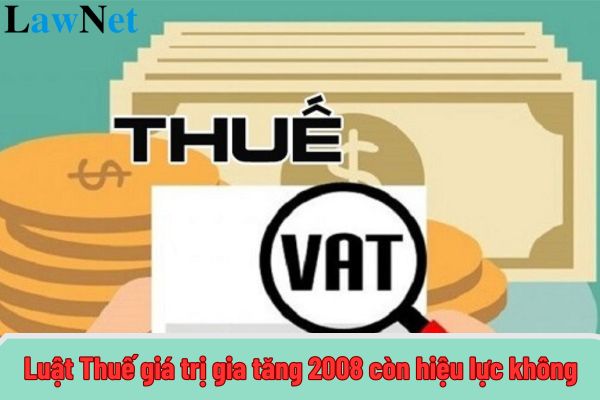Is the 2008 Law on Value-Added Tax still in effect in Vietnam?
Is the 2008 Law on Value-Added Tax still in effect in Vietnam?
Based on Article 18 of the 2024 Law on Value-Added Tax stipulating the effective date as follows:
Effective Date
1. This Law takes effect from July 1, 2025, except as provided in clause 2 of this Article.
2. Provisions on the revenue level of households, individuals engaged in production, business not subject to tax under clause 25 of Article 5 of this Law and Article 17 of this Law take effect from January 1, 2026.
3. The Law on Value-Added Tax No. 13/2008/QH12, as amended and supplemented by Law No. 31/2013/QH13, Law No. 71/2014/QH13, and Law No. 106/2016/QH13, shall cease to be effective from the date this Law takes effect.
This Law was passed by the National Assembly of the Socialist Republic of Vietnam, Session XV, at its 8th sitting on November 26, 2024.
Therefore, based on the aforementioned provisions, the 2024 Law on Value-Added Tax, passed by the National Assembly on November 26, 2024, will replace the 2008 Law on Value-Added Tax.
The 2024 Law on Value-Added Tax will officially come into effect on July 1, 2025. Currently, the 2008 Law on Value-Added Tax remains in effect until June 30, 2025.
*Note: The provision on revenue levels for households, individuals engaged in production, business not subject to tax under clause 25, Article 5, Article 17 of the 2024 Law on Value-Added Tax takes effect from January 1, 2026.

Is the 2008 Law on Value-Added Tax still in effect in Vietnam? (Image from Internet)
What are the conditions for input value-added tax deduction in Vietnam from July 1, 2025?
Based on clause 2 of Article 14 of the 2024 Law on Value-Added Tax, the conditions for input value-added tax deduction from July 1, 2025, are specified as follows:
- There must be a value-added tax invoice for purchasing goods, services, or a document proving the payment of value-added tax at import or a document proving the payment of value-added tax on behalf of a foreign party as stipulated in clauses 3 and 4 of Article 4 of the 2024 Law on Value-Added Tax. The Minister of Finance prescribes the document for paying value-added tax on behalf of a foreign party;
- There must be non-cash payment documents for purchased goods, services, except for certain special cases as regulated by the Government of Vietnam;
- For export goods, services, in addition to the conditions specified in points a and b of this clause, there must also be: a contract with a foreign party for selling, processing goods, providing services; an invoice for selling goods, providing services; a non-cash payment document; a customs declaration for export goods; a packing list, bill of lading, goods insurance document (if any). The Government of Vietnam prescribes conditions for deduction for cases of exporting goods via foreign e-commerce platforms and other special cases.
- Business establishments that do not meet the deduction regulations in clauses 1 and 2 of this Article and invoices, documents made from prohibited actions under the 2024 Law on Value-Added Tax are not allowed to deduct value-added tax.
- The Government of Vietnam details this Article.
What are the prohibited acts in value-added tax deduction in Vietnam from July 1, 2024?
Based on Article 13 of the 2024 Law on Value-Added Tax, the prohibited acts in value-added tax deduction are stipulated as follows:
- Buying, giving, selling, organizing advertising, brokering buying, selling invoices.
- Creating transactions of buying, selling goods, providing services that are not real or not conformable to the law.
- Issuing invoices for selling goods, providing services during a temporary cessation of business activity, except for issuing invoices to customers for executing contracts signed before the notice of temporary business suspension.
- Using illegal invoices, documents, or using invoices, documents illegally as regulated by the Government of Vietnam.
- Failing to transfer electronic invoice data to the tax authority as required.
- Tampering with, misusing, unauthorized access, destroying information systems related to invoices, documents.
- Giving, receiving, brokering bribes, or engaging in other acts related to invoices, documents to obtain tax deductions, tax refunds, embezzle taxes, evade value-added tax.
- Colluding, covering up; conspiring between tax management officials, tax authorities, and businesses, importers, among businesses, importers in using illegal invoices, documents or using invoices, documents illegally to obtain tax deductions, tax refunds, embezzle taxes, evade value-added tax.

